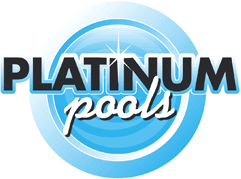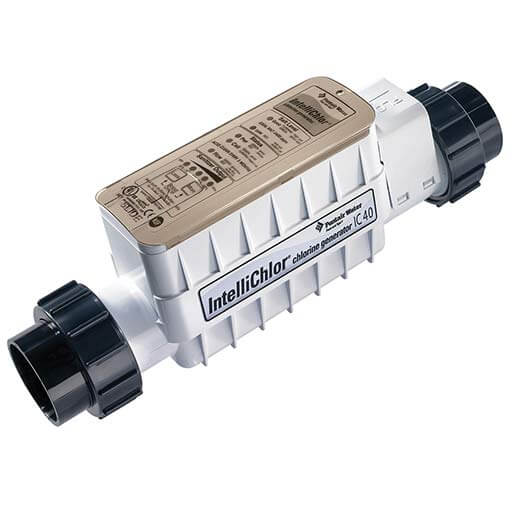To salt or not to salt? That is the question!
As an avid food enthusiast a small part of me wishes this post was about whether you should be salting a dish with kosher, iodized or Himalayan. Forget the salt, maybe you should be using a substitute like Sriracha or Louisiana Hot Sauce? I will have to save that post for a different day because the question you are really curious about today isn’t of the culinary variety.
The burning question is, “Should I convert my pool to a salt water system? My neighbor did it, and I need to know if I should do what Mr. Jones is doing?”
The best way to answer that is with a resounding yes; or maybe not. Like everything there are advantages and disadvantages to upgrading your sanitation system.
You won’t have to beg your neighbor to come by to make sure your erosion feeder is full of tabs.
How does a salt system work?
Probably the best way to start is to briefly explain what the salt system does. By adding a salt system you are not eliminating the need to add additional chemicals and balancers from time to time. You are only replacing the sanitation portion of your system. Once the system is installed you will add food grade quality salt directly to your pool. Once the salt has dissolved into the water the system will begin to monitor the salt level in the water and away we go! The system has a chlorine generator and as the salt water passes through the cell it will generate a super concentrated form of bleach or sodium hypochlorite. This will create chlorine residual in the water which will break down bacteria and other organic material in the water. This is important because we all know Johnny really didn’t shower before cannonballing off the diving board and you need the chlorine to break down all that organic material!
Benefits of using a salt system
I have met few people that enjoy handling the chlorine hockey pucks that come in those 50 pound buckets. The drive to the pool store takes time. The constant up-selling by the pool store guru can be worse than the oil change guys asking if you want a new air filter or wiper blades. This can be trying to say the least. Cutting this step out alone may be worth the upgrade to some.
The salt system will generate chlorine even when you are out of town on your summer vacation as long as the salt levels are within range. You won’t have to beg your neighbor to come by to make sure your erosion feeder is full of tabs. This ensures you will return from your vacation rested, relaxed and to a clear swimming pool. The constant chlorine production makes it easier to maintain the chlorine residual necessary for balanced water.
Some say the water isn’t as harsh. You know after one of those long days swimming you will sometimes have dry or irritated skin? Many people say that the irritated skin issue has lessened since they converted to salt water.
Misconceptions
- “I don’t have chlorine in my pool because I have a salt system now!”
No matter how many times you hear people tell you they have a salt water pool and no longer use chlorine; don’t buy into the hype! Yes, you have salt water in your pool. Yes, you also still have chlorine in your pool. As mentioned above a high concentration of bleach is produced by the system. While this is a very pure form of chlorine without the additives tablets have; it is still chlorine sanitizing your water. - “I don’t need to add chemicals anymore because my salt system balances my water for me!”
While the salt cell does make it easier to maintain healthy sanitization levels you still need to check chemicals. The bleach or sodium hypochlorite has a pH of 14 and pH neutral is 7.2 – 7.8 ppm. Over time your pH will increase so it is no longer in range and you will need to balance for proper water chemistry. Algaecides may still be used as a preventative measure especially if your pool has been prone to algae blooms in the past or if you live in an area with a lot of foliage. Routine phosphate tests are an easy way to make sure you aren’t opening yourself up to an algae bloom. You will also have to add stabilizer to your pool to maintain your chlorine level. If your stabilizer levels fall below 30 ppm it will be difficult to maintain a chlorine residual especially in particularly hot areas of the country. - “I have been to the ocean and I don’t want to taste that much salt in my pool.”
The salt level in the ocean is about 40,000 ppm and you only need to maintain your salt at 3000 ppm. This number will vary depending on the system. I’m no mathematician but that is a pretty big difference; properly maintained, there should be very little if any salt taste. - “I am going to save a lot of money with a salt system because I won’t be adding all those chemicals!”
Well, this is kinda true, but not really. While you will save $200-$300 on chlorine tabs per season (more if your pool is open year round) you are still going to have some chemical cost. You will need to add a maintenance dose of salt from time to time among other water balancers. We are also finding that a properly maintained chlorine cell has a life span of 4-5 years. Once the cell goes bad you will need to replace it and you will be spending around $1,000 for a new cell depending on the brand. This cost will nearly wipe out the money you saved on chlorine tables over that 4-5 year period. Think of it as financing your chlorine, sure you save money for a few years, but those savings will catch up to you when it is time for a new cell.
There are a lot of reasons to switch including ease of maintenance, better feeling water and avoiding the pool store. If you are looking to save money or have a completely maintenance free pool; a salt system is going to miss the mark. If you decide to pull the trigger; a system we like is the Pentair IC20 or IC40. Feel free to peruse our products page for more details on that system. If you still have burning questions feel free to contact us online or the old fashion way, the good ol’ telephone. We are happy to answer any and all questions that you may have. Happy swimming!





